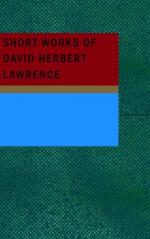|
This section contains 6,066 words (approx. 21 pages at 300 words per page) |

|
SOURCE: "The Poetry of D. H. Lawrence," in The New Mexico Quarterly Review, Vol. 14, March 13, 1948, pp. 289-303.
In the following essay, Glicksberg examines Lawrence's poetry to support his thesis that Lawrence was engaged in creating his own religion that eschewed science and materialism.
There is no contradiction in the fact that Lawrence's ideas on human nature and society are muddled while his poetry is flame-like, instinct with beauty organically felt and sensuously communicated. When he trusted his feelings he was on firm ground; when his powerful sensibility ruled him he could not go wrong. Each impression leaped forth like a radiant beam of sunlight; form and substance fused in a lyrical moment of incandescent, imaginative perception. His poems are vascular, charged with a living bloodstream. They could no more be composed according to rule than a flower can be prepared synthetically in a crucible. The art seems as...
|
This section contains 6,066 words (approx. 21 pages at 300 words per page) |

|


